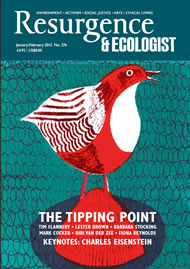If you had the chance, would you change the world? Of course you would. There are plenty of things you would change right now, if you were given a magic wand.
After all, the world could certainly do with improvement. Sometimes we lie awake at night worrying about its problems. In sunnier moments, we dream about how delightful it could be. But either way, we often conclude that changing the world must be hard work, if not impossible, and so we don’t even try.
It’s a job for someone else, we think, partly because of how we were taught history at school. Thomas Carlyle said that history is “but the biography of great men”, and that idea lingers. But Tolstoy disagreed: history, he said, is composed of an infinitely large number of infinitesimally small actions that we all do – or don’t do – every day.
Think about an election: you either vote for this party, or that one, or none. Whatever you do has an effect on the outcome. What Tolstoy was saying is that the same applies to everything you do, all the time.
When we recognise that we have an impact on the way things are, we usually feel motivated to exercise it more deliberately. And the good news is that the thing we should do is usually the thing we want to do, because otherwise we’re unlikely to persist. Don’t try to “end war” if you would rather “make the local streets beautiful by guerrilla gardening”. (And vice versa.)
If you struggle to come up with a mission, ask yourself this: what would you do if you knew you couldn’t fail? It’s important to ask the question this way, so that you come up with something astonishing, rather than a mission that is modest, doable and frankly boring.
Mulling over that question, you may identify a mission so amazing that you prefer not to mention it to friends, lest they think you are bonkers or have developed a messiah complex. That’s great. But the sheer grandeur of your mission can raise a problem: you feel daunted by it. You will enshrine it as an icon, an object for contemplation, like a beautiful painting that is beautifully framed – but nobody is painting it, so you will never make it happen.
In order to overcome this, try to move away from static thinking to process thinking: stop imagining your mission as a painting and think of it instead as a dance, or a piece of music, to be enjoyed from one moment to the next.
Remember that, just as a piece of music unfolds from one note to the next, nothing in human history has ever been accomplished except gradually. Neil Armstrong didn’t wake up one morning and go to the moon. Wangari Maathai didn’t plant millions of trees alone. Rosa Parks didn’t eliminate segregation in the US all at once. All those great things were done bit by bit. Parks may have started the process by refusing to give up her seat on a bus, but others had to join the boycott, and the struggle lasted for months.
When we recognise the importance of the small steps, we can start to enjoy and admire our own small achievements. We can stop fixating on the end, and devote attention instead to the means: every step becomes worthwhile in its own right. And with each small thing we accomplish, we gain courage to try something a little more ambitious next time.
So go ahead: change the world. You don’t have to change the whole world, if you don’t want to. Just change your world. Identify your mission, then break it into small steps by asking yourself this second, incredibly valuable question: what can you do in the next 24 hours?







